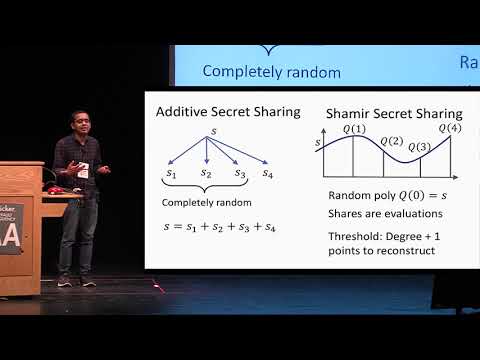CryptoDB
On the Local Leakage Resilience of Linear Secret Sharing Schemes
| Authors: | |
|---|---|
| Download: |
|
| Presentation: | Slides |
| Conference: | CRYPTO 2018 |
| Abstract: | We consider the following basic question: to what extent are standard secret sharing schemes and protocols for secure multiparty computation that build on them resilient to leakage? We focus on a simple local leakage model, where the adversary can apply an arbitrary function of a bounded output length to the secret state of each party, but cannot otherwise learn joint information about the states.We show that additive secret sharing schemes and high-threshold instances of Shamir’s secret sharing scheme are secure under local leakage attacks when the underlying field is of a large prime order and the number of parties is sufficiently large. This should be contrasted with the fact that any linear secret sharing scheme over a small characteristic field is clearly insecure under local leakage attacks, regardless of the number of parties. Our results are obtained via tools from Fourier analysis and additive combinatorics.We present two types of applications of the above results and techniques. As a positive application, we show that the “GMW protocol” for honest-but-curious parties, when implemented using shared products of random field elements (so-called “Beaver Triples”), is resilient in the local leakage model for sufficiently many parties and over certain fields. This holds even when the adversary has full access to a constant fraction of the views. As a negative application, we rule out multi-party variants of the share conversion scheme used in the 2-party homomorphic secret sharing scheme of Boyle et al. (Crypto 2016). |
Video from CRYPTO 2018
BibTeX
@inproceedings{crypto-2018-28850,
title={On the Local Leakage Resilience of Linear Secret Sharing Schemes},
booktitle={Advances in Cryptology – CRYPTO 2018},
series={Lecture Notes in Computer Science},
publisher={Springer},
volume={10991},
pages={531-561},
doi={10.1007/978-3-319-96884-1_18},
author={Fabrice Benhamouda and Akshay Degwekar and Yuval Ishai and Tal Rabin},
year=2018
}

